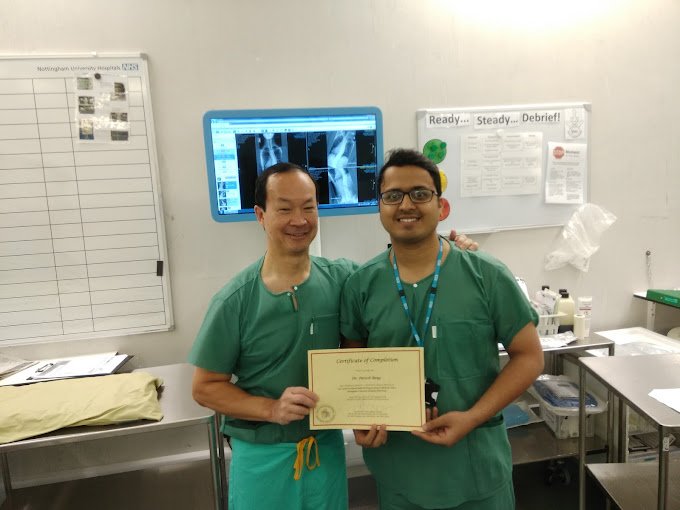Dr. Paresh Bang | Matruchhaya Spine Clinic
Meet Our Doctor
Dr. Paresh Bang
Consultant Spine Surgeon

Slip Disc Specialist In Betul

Slip Disc Specialist
They are also prescribed anti-inflammatory medications like non-steroidal anti-inflammatory medications or spinal epidural injections to relieve troubling symptoms. It is best to consult the specialist for a proper diagnosis of the condition and treatment options.
Symptoms of a Slipped Disc
The symptoms may vary as per the position of a herniated disc and the size of the herniation. A patient may feel slight pain or no pain if the slipped disc doesn’t press a nerve. However, some common symptoms are:
- Neck pain: A sharp pain is experienced in between shoulder blades and neck. The pain aggravates with sudden movements or uncomfortable position.
- Numbness: Many people with slipped discs feel a tingling sensation or numbness in the areas closer to affected nerves.
- Weakness: Muscles near the affected nerves weaken and make patients stumble or prone to accidents.
- Leg pain: A patient may feel intense pain in the leg (thigh, buttocks, and calf) if a herniated disc is within the lower back.
Treatment
Conservative treatment helps in modifying daily activities for avoiding movements, which cause pain. This way, a patient’s symptoms can be relieved within a few days or weeks.
- Medications: Over-the-counter pain medications: For mild to moderate pain, the doctor may prescribe over-the-counter pain medication like naproxen sodium (Aleve), ibuprofen (Advil, Mortin IB, etc.) and acetaminophen (Tylenol, others).
- Muscle relaxers: It can be prescribed to patients if they experience muscle spasms.
- Cortisone injections: If the patient’s pain does not improve with oral medicines, corticosteroid injections are prescribed to be injected into the area near the spinal nerves.
- Opioids: Due to the significant side effects of opioids, as well as their potential for addiction, most doctors avoid prescribing them for slip disc treatment.
- Therapy: A doctor may even suggest undergoing physical therapy to relieve the pain. With the help of physical therapists, patients are taught specific exercises and positions to reduce the pain of the slip disc.
- Surgery: Some people with slip discs may need surgical treatment. A doctor may suggest surgery in case the conservative treatment fails to relieve specific symptoms after a few weeks, especially if a patient continues to experience:
- Difficulty in walking or standing
- Poorly controlled pain
- Weakness or numbness
- Bowel control or loss of bladder
Risk Factors Associated with Slip Disc
- Gender: Men usually have a higher risk of slip disc as compared to women.
- Age: It is the most common risk factor that occurs in people between the ages -35 to 50.
- Family history: Slip disc is even considered to have a hereditary tendency in a family line. Physically demanding work, such as heavy lifting, pushing or pulling actions, could injure the disc.
- Obesity: Overweight makes a person 12 times more likely to get a slip disc after a microdiscectomy surgery.
Symptoms of a Slipped (Herniated) Disc
A herniated or slipped disc occurs when the soft inner material of a spinal disc protrudes through its outer layer, pressing on nearby nerves. Common symptoms include:
- Lower back pain: Often radiating to the legs (sciatica).
- Neck pain: Radiating to the arms.
- Numbness or tingling: In the arms or legs, depending on the location of the herniated disc.
- Muscle weakness: Weakness in specific muscles associated with nerve compression.
- Difficulty with movement: Reduced flexibility and difficulty with walking, sitting, or bending.
Types of Specialists for a Slipped Disc
- Orthopedic Spine Surgeons:
- Specialize in a treating musculoskeletal conditions, including spinal disc problems.
- They perform surgeries like microdiscectomy, spinal fusion, or other minimally invasive techniques.
- Neurosurgeons:
- Specialize in the nervous system, including the spine or spinal cord.
- Neurosurgeons often perform surgeries for herniated discs, especially when nerve compression is severe.
- Pain Management Specialists:
- These doctors focus on non-surgical treatments for slipped discs, such as medications, epidural steroid injections, and physical therapy.
- They are often consulted before considering surgical options.
- Physical Therapists:
- While not surgeons, physical therapists specialize in rehabilitating patients with herniated discs through exercises to strengthen the back and core muscles, improve flexibility, and reduce pain.
Treatments for a Slipped Disc
- Conservative Treatments:
- Physical therapy: Customized exercises to strengthen muscles around the spine, improve posture, and alleviate pressure on the nerve.
- Medications: Anti-inflammatory drugs (NSAIDs), muscle relaxants, and painkillers.
- Epidural steroid injections: Cortisone injections into the affected area to reduce inflammation and relieve pain.
- Chiropractic care: Spinal manipulation to alleviate symptoms (though this should be done with caution and only under the guidance of a healthcare provider).
- Surgical Treatments (when conservative treatments fail):
- Microdiscectomy: A minimally invasive surgery where a portion of the herniated disc is removed to relieve pressure on the nerve.
- Laminectomy: Removal of part of the vertebra to create more space for the nerve, often used in cases of spinal stenosis with a herniated disc.
- Spinal fusion: In cases of instability or severe degeneration, two or more vertebrae are fused to stabilize the spine.
- Non-Surgical Alternatives:
- Acupuncture: For pain relief.
- Heat and ice therapy: To reduce inflammation and muscle spasms.
- Lifestyle changes: Maintaining a healthy weight, proper posture, and avoiding activities that exacerbate the condition.
Choosing a Slip Disc Specialist
- Experience:
- Look for a doctor with expertise in treating herniated discs, particularly with a track record of successful outcomes.
- Check if the specialist is board-certified in orthopedic surgery, neurosurgery, or pain management.
- Conservative vs. Surgical Approach:
- Some specialists focus on non-surgical treatments, while others are surgeons. It’s important to consult with a specialist who can offer a broad range of options and only recommend surgery if necessary.
- Hospital Affiliation:
- Choose a specialist affiliated with a reputable hospital or spine center, as they will have access to the latest technology and comprehensive care.
- Patient Reviews and Testimonials:
- Research the specialist’s patient reviews to understand their success rates and patient satisfaction.Contact Us
When to See a Specialist
You should see a slip disc specialist if:
- Your symptoms have not improved with rest, physical therapy, or medication.
- You experience significant pain, numbness, or weakness in your legs or arms.
- You have difficulty controlling your bladder or bowels, which may indicate a more serious condition like cauda equina syndrome.Visit Our Hospital
